Inventors, Scientists & Physicians
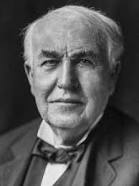 Thomas Alva Edison (February 11, 1847 - October 18, 1931)
Thomas Alva Edison (February 11, 1847 - October 18, 1931)
Thomas Edison lost much of his hearing by his early twenties. Despite this, Edison worked in the field of telegraphy — transmitting information via communication systems — where he thrived as an innovator and inventor. In Edison's New Jersey lab, he developed audio devices, invented the incandescent lightbulb, and helped birth the motion picture industry. Edison received 1,093 patents before his death.
Source: https://www.thomasedison.org/brief-biography
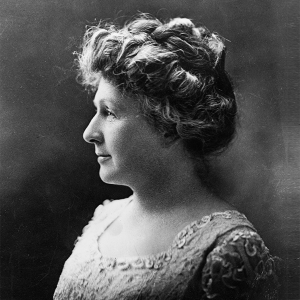 Dr. Annie Jump Cannon (December 11, 1863 — April 13, 1941)
Dr. Annie Jump Cannon (December 11, 1863 — April 13, 1941)
Annie Jump Cannon, PhD is considered as one of the greatest astronomers of the 20th Century. Dr. Jump Cannon suffered from hearing loss during childhood which rendered her nearly deaf by the time she reached adulthood. Known as the “census taker of the sky,” Dr. Jump Cannon was a brilliant astronomer that revolutionized the way scientists classify stars. Not only did she develop the important Harvard spectral system, she also classified about 350,000 stars manually. Dr. Jump Cannon became the first woman to receive a Doctor of Astronomy degree from Groningen University, the first woman ever to receive an honorary degree from Oxford University, and in 1931 she became the first woman to be awarded the Henry Draper Medal of honor from the National Academy of Sciences.
Source: https://www.womenshistory.org/education-resources/biographies/annie-jum….
 Dr. Albert Einstein (March 14, 1879 - April 18, 1955)
Dr. Albert Einstein (March 14, 1879 - April 18, 1955)
Perhaps one of the most famous figures known to have dyslexia is Dr. Albert Einstein, a theoretical physicist who won the Nobel Prize in Physics in 1921 and has become synonymous with intelligence and wit. Though as a child and teenager Dr. Einstein showed signs of brilliance and creativity in his interests in geometry, he also showed signs of weakness in speech and verbal development, as well as several school subjects. “Nothing would become” of the boy, his teachers believed. “Words or language, as they are written or spoken, do not seem to play any role in my mechanism of thought,” he wrote to mathematician Jacques Hadamard in 1945.
To his friend Max Wertheimer, a psychologist, Dr. Einstein further explained that: “Thoughts did not come in any verbal formulation. I very rarely think in words at all. A thought comes, and I may try to express it in words afterwards.” Throughout the years, he described writing as being a “difficult” task in which he communicated “very badly.” But the scientist pressed on in his studies, using his unconventional thinking and methodology to discover what has become the most famous mathematical equation of all time.
“Imagination is more important than knowledge. Knowledge is limited. Imagination encircles the world.”
Source: https://journal.imse.com/12-famous-people-who-struggled-with-dyslexia-b…
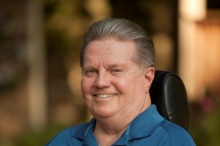 Ralph Braun (December 18, 1940 - February 8, 2013)
Ralph Braun (December 18, 1940 - February 8, 2013)
Ralph Braun was diagnosed as a child with spinal muscular atrophy and no longer able to walk by his mid teens, he channeled his personal need for mobility equipment into his first invention: a powered scooter that he named the Tri-Wheeler. The Tri-Wheeler’s success and subsequent manufacture resulted in Ralph Braun’s creation of a company called Save-A-Step Mfg. But ultimately, Ralph made his biggest mobility mark on the adaptive automotive industry segment. According to a company biography, Ralph added hand controls and a hydraulic lift to an old postal-service Jeep so he could drive back and forth to work. When Dodge launched its first full-sized, front-engine van, Ralph figured out how to install a wheelchair lift inside it.
The Braun Corp. was incorporated in 1972, and the company originally known for its wheelchair lifts expanded to manufacture wheelchair-accessible van conversions. Today, the company works with Chrysler, Dodge, Honda and Toyota vehicles.
Source: https://mobilitymgmt.com/articles/2013/02/14/ralph-braun-passes-away.aspx
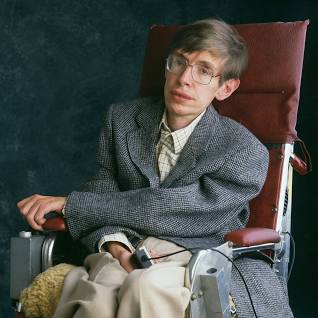 Dr. Stephen Hawking (January 8, 1942 - March 14, 2018)
Dr. Stephen Hawking (January 8, 1942 - March 14, 2018)
Dr. Stephen Hawking was a British scientist, professor and author who performed groundbreaking work in physics and cosmology, and whose books helped to make science accessible to everyone. At age 21, while studying cosmology at the University of Cambridge, he was diagnosed with amyotrophic lateral sclerosis (ALS). Part of his life story was depicted in the 2014 film The Theory of Everything. Dr. Hawking was named a fellow of the Royal Society at the age of 32, and later earned the prestigious Albert Einstein Award, among other honors. He also earned teaching stints at Caltech in Pasadena, California, where he served as visiting professor, and at Gonville and Caius College in Cambridge.
Source: https://www.biography.com/scientists/stephen-hawking
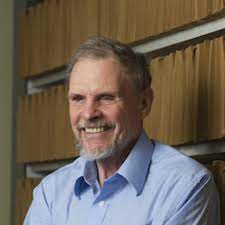 Dr. Geerat Vermeij (September 28, 1946 - Present)
Dr. Geerat Vermeij (September 28, 1946 - Present)
Geerat J. Vermeij, PhD, is a Dutch-born professor of paleobiology at the University of California at Davis. Blind from the age of three, he graduated from Princeton University in 1968 and received his PhD in biology from Yale University in 1971. An evolutionary biologist and paleontologist, he studies fossil and living molluscs and has published more than 250 scientific papers on subjects ranging from taxonomy to functional morphology, patterns in the history of life, invasion, the causes of extinction, and the relation between economics and evolution. His books include Evolution and Escalation: An Ecological History of Life; A Natural History of Shells; Privileged Hands; Nature: An Economic History, and The Evolutionary World: How Adaptation Explains Everything from Seashells to Civilization. Dr. Vermeij received a MacArthur Fellowship in 1992 and the Daniel Giraud Elliot Medal from the National Academy of Sciences in 2000. In 2006, Dr. Vermeij received the Paleontological Society Medal.
Source: http://www.nasonline.org/member-directory/members/62298.html
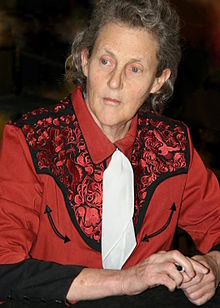 Dr. Temple Grandin (August 29, 1947 - Present)
Dr. Temple Grandin (August 29, 1947 - Present)
Temple Grandin, PhD, is a professor, best-selling author, animal behaviorist, and autism self-advocate in top demand as an international speaker. An extraordinary inspiration for autistic children and their parents, she is the subject of the Emmy and Golden Globe winning HBO film, Dr. Temple Grandin, starring Claire Danes and Julia Ormond, and she was also one of Time magazine’s 100 most influential people in 2010.
Diagnosed with autism when she was three, Dr. Grandin’s mother rejected her doctor’s advice to institutionalize her, and provided her with intensive speech therapy, a structured home and a nurturing school environment. Later, with encouragement from her high school science teacher and an aunt who ran a ranch in Arizona, Dr. Grandin pursued a career in animal science. With unique abilities to think visually and recall small details she began to design humane live-stock handling equipment, eventually revolutionizing the industry. Today over half the cattle in North America are handled in a system she designed. Other professional activities include developing animal welfare guidelines for the meat industry and consulting with McDonalds, Wendy’s International, Burger King, and other major companies.
Source: https://www.cshl.edu/giving/double-helix-medals-dinner/past-dhmd/2011-2/temple-grandin/
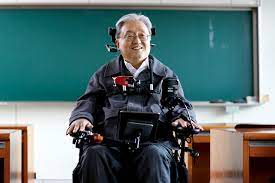 Dr. Sang-Mook Lee (October 18, 1962 - Present)
Dr. Sang-Mook Lee (October 18, 1962 - Present)
Dr. Sang-Mook Lee is an Associate Professor at the School of Earth and Environmental Sciences, Seoul National University, the foremost academic institute in Korea where he specializes in Marine Geology and Geophysics. His main interest is in plate tectonics, in particular, underwater geodynamic processes along plate boundaries including those at mid-ocean ridges, subduction zones and marginal basins with the aid of the state-of-the-art instruments and research vessels. On July 2 2006, during a geologic field trip with students in the California desert, Dr. Sang-Mook was critically injured in a van rollover accident which made him quadriplegic. The injury on cervical spine number four completely paralyzed him below his neck and shoulder. Nobody thought he would return. However, in less than six months, he came out of the hospital and returned to the university in an electric wheelchair.
Dr. Sang-Mook’s main passion is still in scientific research and education. At Seoul National University, he established an undergraduate interdisciplinary program in computational sciences as part of universal design in higher education and is starting a new initiative for open online education. He is also the main force behind the movement to establish a graduate program in rehabilitation science and engineering. In addition to managing his time among teaching, conducting research in earth science and running a big national program, Sang-Mook makes many public speeches on diverse topics around the world including earth science, disability and assistive technology. His story was featured in the New York Times, NOVA and PBS.
https://www.integramouse.com/en/user-stories/sang-mook-lee/
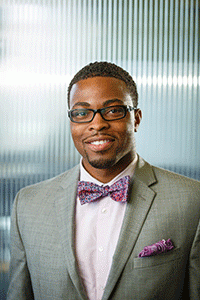 Dr. Feranmi Okanlami
Dr. Feranmi Okanlami
Dr. Feranmi Okanlami’s – also known as “Dr. O” – journey in disability advocacy began unexpectedly. During his 4th year surgical residency at Yale University, Dr. O was paralyzed during a swimming incident that caused his life to take a drastic turn. Now, as an advocate for disability inclusion, and especially diversity and inclusion in the field of medicine, Dr. O makes it his mission to ensure that the conversation of disability and diversity are at the table when talking about the experiences of doctors, medical students, and patients. He currently serves as faculty member at Michigan Medicine at the University of Michigan and speaks to medical students and practitioners across the nation.
Source: https://www.aapd.com/black-disability-history-past-present-future/
